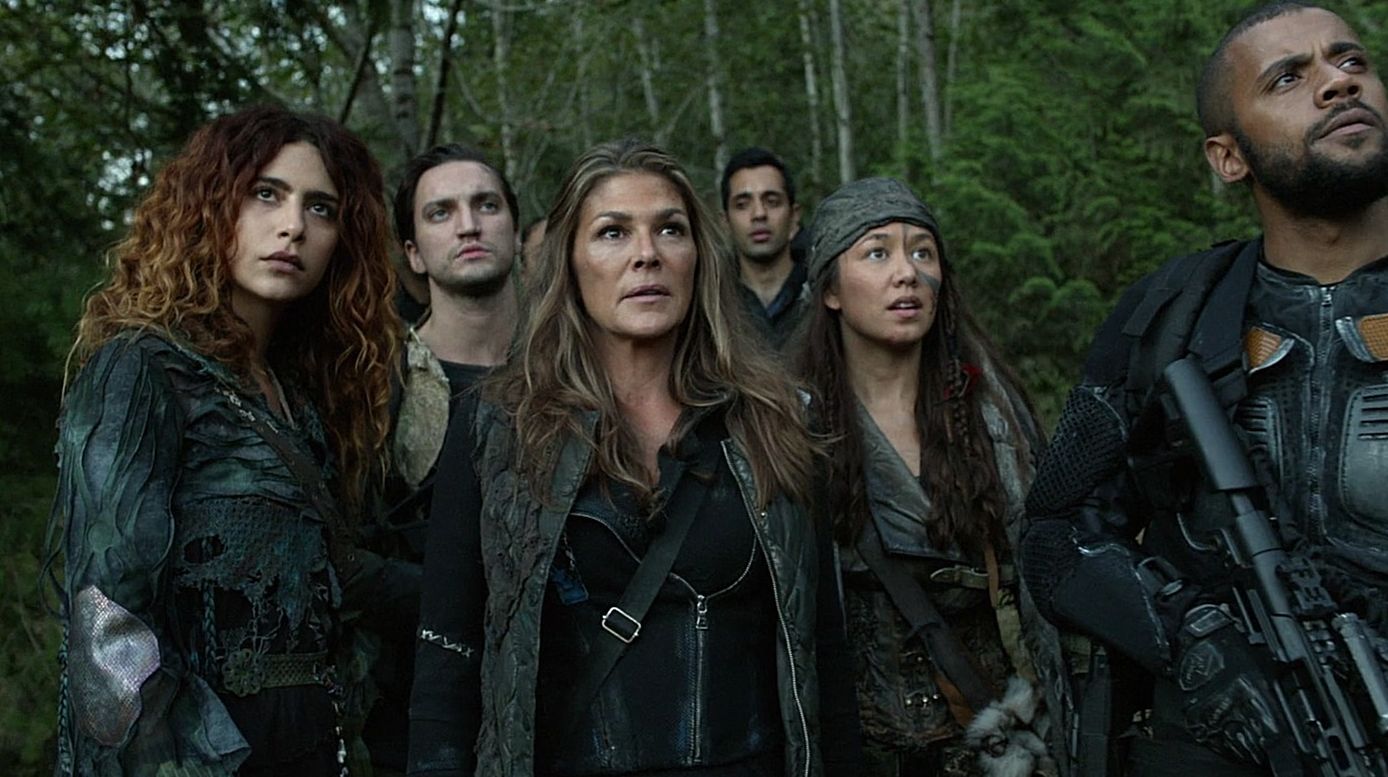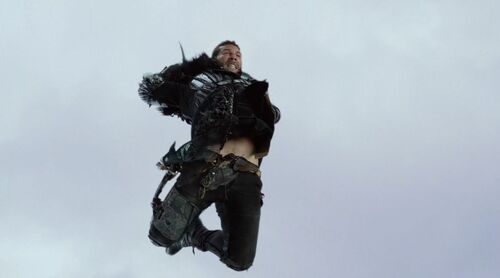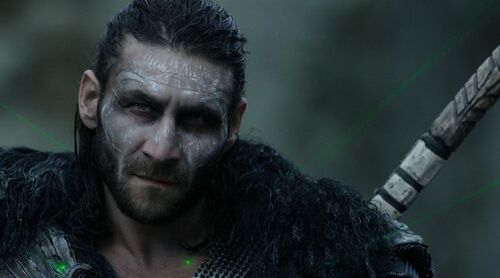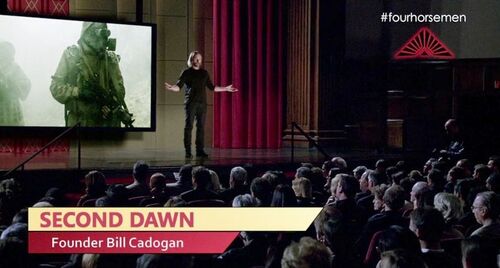
The 100 S4E4: A Lie Guarded
 A Lie Guarded burned through the story, relying on plot gimmicks instead of character motivation to drive an ultimately disjointed episode.
A Lie Guarded burned through the story, relying on plot gimmicks instead of character motivation to drive an ultimately disjointed episode.
An excuse is worse and more terrible than a lie; for an excuse is a lie guarded.—Alexander Pope
IT WAS THE MEDIOCRE OF TIMES, IT WAS THE WORST OF TIMES
The emotional core of A Lie Guarded is the question: Why are we fighting? And what does the fight make us? Like Heavy Lies the Crown (season 4, episode 2), this episode wants to pick at the dark fate that continues to circle around our heroes. Can they rise above the past? Or are they always destined to be fighting the same fights as the generations before them?
That question thrums in the background of the episode as Clarke struggles with how to lead Arkadia, as Echo questions her raison d’étre, as both Bellamy and Luna give voice to the fear that they are always going to be fighting, they are always going to end up in a jail cell or with a gun trained on them, ready to kill.
Unfortunately, these questions aren’t explored, nor are they used to fuel the action of the plot. Instead, A Lie Guarded relies on plot gimmicks and contrived motivations to push the action to a breakneck speed. All of this leads to a set of final scenes that should have been viscerally brutal but instead fell flat.
HIDE AND...WAIT, YOU WERE SUPPOSED TO BE HIDING
The list. Oh, the list. Clarke’s albatross during episode three, The Four Horsemen, and the ending of that episode telegraphed someone finding it when Clarke (irrationally) just folded and stuck it in an open cubby. Granted, the Chancellor’s Room is usually locked, but with as much Clarke detests even the idea of that list and the sensitive information it contains, it becomes an obvious plot gimmick for the Arkadian storyline.
Of course, Jasper finds the list. Surly, party-like-it’s-1999 Jasper doesn’t mind that he’s not on it, but Monty isn’t either. Monty is just as crucial to the Delinquents and Skaikru’s survival as Bellamy, Clarke, and Raven are, and with the sweet character moments between Clarke and Monty at the top of the episode, it’s easy to see that the audience is being manipulated into feeling shock and outrage at Clarke’s choices. Which, on one hand, fine—that’s what storytelling is. But the puppet strings shouldn’t be so obvious, and while Clarke’s reasoning for leaving Monty off the list are supremely rational (his skills are redundant), they don’t fit into what the show has been telling and showing us since Earth Skills (season 1, episode 2) when Clarke tells Monty that his skill set is what is “gonna save us all.”
The moral and ethical debate around the list is a worthy one to have, as is the discussion of secrecy and transparency in government. Monty finds Clarke after this reveal and asks her to just tell the Arkadian people, that they might surprise her with their willingness to work and compromise. Clarke says no, that the information is too dangerous and they need people to keep working. Monty then decides to read off the list on the Rover's loudspeaker to all of the Arkadians.
Confronted by the crowd of Arkadians, Clarke is, to her credit and detriment, honest. She weighted the list to necessary professionals and young women who could have children, excluding those, like Harper, with a history of family illness. But Clarke can’t connect with the crowd, a weakness of hers since season one. They grow increasingly angry with her until Jaha intervenes, and in a smooth, rousing speech tells them that The List is gone, but they’ll have a work-based lottery instead. The ever plot-driven Arkadian crowd acquiesces and sets off to work.
Here, Jaha gives Clarke some necessary insight that is all the stranger given who it’s coming from. You told people they had no value, he says, and people need to feel like they have something to fight for. It’s wisdom that Clarke needs to hear, but is somewhat subverted by her scene with Jasper when she goes to release him from the brig. Jasper reminds her that “when Jaha is looking reasonable it’s time to reassess.” Jaha is responsible not only for sending the Delinquents to the ground and enabling ALIE and the City of Light but also for some of the worst abuses of power on the Ark. Like, as mentioned in Heavy Lies the Crown, floating Clarke’s father for wanting to tell the Ark the truth about the failing life support systems.
A grace note to Clarke's character development is that while she seems like she wants to follow another mentor in these tough times, both Monty and Jasper are telling Clarke to be herself, to trust her own wisdom. “Who are you?” Monty asks her at one point. “When did you become this person?”
“I haven’t become anyone,” Clarke says, and that’s the thing. After two seasons of deconstructing both the systems and the leaders that made Clarke who she is, and third season where she ran from figuring it out, in the fourth season she’s faced with a question. Who is she? And is she someone that deserves to lead, much less survive?
YOU SEE THERE'S AN ISLAND WITH A HATCH AND A LAB...
The Medical Squad storyline swerves into Lost territory with a boat ride to Becca’s island. We were last there in Wanheda Part One (season 3, episode 1). Murphy was freed from the lighthouse bunker where he spent three months (eating all of the provisions and drinking all the wine) only to find that Jaha had colluded with ALIE. Now, though, we know that Becca’s Island not only has a lighthouse/bunker and a mansion, but also a lab where she created nightblood.
The Medical Squad follows Jaha’s map and instructions to the lab so that they can engineer a solution from Luna’s nightblood to save them from the oncoming radiation. Becca created nightblood, and Abby and Jackson reason that if her lab still has the records, they might be able figure out a solution.
After Nyko, the Trikru healer, is killed trying to protect Luna from the weaponized drone army, Luna bolts. Luna has qualms about trusting the Sky People, which is both understandable and frustrating. Clarke at one point tried to force the Flame into Luna’s neck, but then the Sky People tried to help save Adria, even if it was unsuccessful. It makes sense though that Luna is done with the struggle, having lost both her people and what her oil-rig commune represented—a way of life away from the violence of the Grounder society.
Raven intercepts Luna as she walks toward the boat, clearly intending to steal the boat. Raven holds a gun on her and tries to force her to return, but realizes that tactic clearly won’t work. So she puts the gun down and gives her a choice, come with us and save humanity or walk away. Raven won’t stop her.
Giving Luna a choice here is a compelling foil to the list that Raven demanded Clarke make in The Four Horsemen. Not only did she press Clarke to do it, but furthermore the list itself stands for taking away people’s choice in their own fate. Here, Raven learned that lesson on an individual level, while Clarke learned it (with a side lesson in political optics) on a community one.
In the end, Raven and Luna team up to steal a drone. Raven hacks it and uses that to shut down the drone army. Hacking into the drones clearly came with a physical cost, a sure dropped pin to future developments since hacking and coding hasn’t caused Raven pain before. But for now, the group finds Becca’s immaculately preserved lab and everything seems hopeful and foreboding all at once.
A MESS
While the plot gimmick of the list was a minor irritation in an otherwise mostly-satisfying storyline, Octavia’s “death” was just a mess. The technical execution and writing priorities of the prison cell scene absolutely fumbled whatever emotional and character impact Octavia’s fake “death” was supposed to have. It was the worst of season three come ‘round again, and in an episode that was already problematic in terms of plot and motivation, absolutely sank it.
There’s something to be said about priorities in storytelling, and the Octavia storyline had too many and performed none of them well. Worse, it was based on a gimmick that, like the list, was telegraphed from the instant the sword fight started. When Octavia fell over the cliff and Echo looked on mournfully (and why? What for? I’m all for more Echo, but there’s no signposting here to suggest why Echo might start looking askance at killing), we all knew that Octavia wasn’t dead.
So that kind of fake-out immediately undermines the next scene in the storyline. Roan imprisoned Kane and Bellamy on the accusation that the Sky People had been lying to them about working for a cure for all the Grounders. Which is not entirely true, just that Skaikru had two plans and Kane informed Roan of neither. Why? Who knows. Plot, I guess. So Kane and Bellamy are locked up, and they share a poignant scene where Bellamy tells Kane that they’re always going to end up here, on the brink of war, so what’s the point. Kane tries to buoy him, but it’s obvious that Bellamy doesn’t buy it. Just then, Roan and Echo come to deliver the news that Azgeda is going to war against Trikru and Skaikru.
Bellamy pushes back on them, saying that Octavia will get to Arkadia first and will warn them. You’ll lose, he says.
It’s the perfect tee-up for Echo to deliver the news that Octavia is dead, and she does, but the moment is undercut from the moment Octavia “died”. First, the audience knows it’s coming. That can work effectively sometimes, but disparity of the stakes being so incredibly high for Bellamy’s character, and that most viewers would realize that Octavia isn’t dead, is too much for the moment to hold any real weight.
The scene still could have worked but for some reason the script and editing/camera choices didn’t seem particularly interested in Bellamy’s reaction other than as a tool for audience manipulation and Echo’s character growth. In that moment, the worst fear and driving motivation of one of the main characters has just come true. Sure, the audience might suspect that’s not so, but for him it is. In that moment, nothing else in that scene should matter as much. Serve it with a side of Roan’s mixed emotions and Echo’s dawning regret, but the heart of the story in that scene is that Bellamy “my sister, my responsibility” and “I’ll keep you safe” and “I need you to live” Blake’s sister just died. Instead, the editing pulls focus onto all the other characters in the scene, and the lacquered-on surrealistic vibe doesn’t enhance the emotion but instead distracts. No sooner than it starts, it ends, Bellamy and Kane being hauled up to be taken as hostages to Arkadia.
Of course, Octavia isn’t dead. She struggles up onto her horse, Helios, from the bottom of the ravine. “Take me home,” she tells Helios, and they ride off.
REVIEW
A Lie Guarded had interesting character moments wedged between obvious plot machinations, weak motivations, and messy priorities. It’s hard to give a definitive say on it, because while some scenes delivered (I thought the scenes in Arkadia were done well) others didn’t, to the point of being mishandled.
The cast is, as always, fantastic. Though I didn’t like the execution of the prison scene, Bob Morley (Bellamy) gave a heart-breaking performance that found the despair and shock in that moment. Zach McGowan, Tasya Teles, and Henry Ian Cusick were all fantastic in their response to Bellamy’s raw, almost unwatchable agony. Next time less distracting camera, editing, and script work, more letting your actors do what you hired them to do.
The 100 continues to thoughtfully handle disability and mental health representation through the characters of Raven, Emori, and Jasper. Raven’s journey in season three was one of the season’s highlights, and this season she continues to struggle with balancing her emotional health, physical limitations, necessity to the group, and a new ability that might not be all that it seems. Emori, born with a mutated hand, is loved whole-heartedly by Murphy, and we see in subtle ways that his support is helping her grow her own self-confidence. Jasper, struggling with depression, PTSD, and suicidal ideation might have found a new equilibrium with the apocalypse nigh, but (to me) his pranks show that a search for meaning, for happiness, in these end days is lurking behind the veneer of good times. The 100 doesn’t gloss over the ramifications of Raven’s disability, Emori’s hand, or Jasper’s depression in this world. Watching their journeys is sometimes painful, sometimes triumphant, and a part of the story treated with respect.


